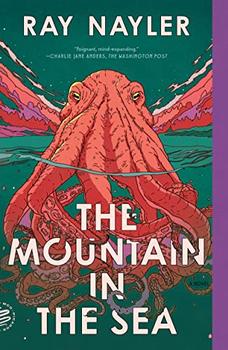Summary | Excerpt | Reviews | Beyond the book | Read-Alikes | Genres & Themes | Author Bio

A Novel
by Ray NaylerHumankind discovers intelligent life in an octopus species with its own language and culture, and sets off a high-stakes global competition to dominate the future.
Rumors begin to spread of a species of hyperintelligent, dangerous octopus that may have developed its own language and culture. Marine biologist Dr. Ha Nguyen, who has spent her life researching cephalopod intelligence, will do anything for the chance to study them.
The transnational tech corporation DIANIMA has sealed the remote Con Dao Archipelago, where the octopuses were discovered, off from the world. Dr. Nguyen joins DIANIMA's team on the islands: a battle-scarred security agent and the world's first android.
The octopuses hold the key to unprecedented breakthroughs in extrahuman intelligence. The stakes are high: there are vast fortunes to be made by whoever can take advantage of the octopuses' advancements, and as Dr. Nguyen struggles to communicate with the newly discovered species, forces larger than DIANIMA close in to seize the octopuses for themselves.
But no one has yet asked the octopuses what they think. And what they might do about it.
A near-future thriller about the nature of consciousness, Ray Nayler's The Mountain in the Sea is a dazzling literary debut and a mind-blowing dive into the treasure and wreckage of humankind's legacy.
On the whole, Nayler's strength as a writer lies in the tangible realism of the physical environments he describes and the inner monologues of his characters. With each storyline he starts off small and gradually expands, using strategic clues and events to push the plot forward. While a bit monotonous in areas involving jargon-heavy dialogue, Nayler still effectively balances real-world science with engaging characters and a multifaceted plot that steadily builds and accelerates until many readers will likely find it hard to put the book down...continued
Full Review
 (841 words)
(841 words)
(Reviewed by David Bahia).
 In Ray Nayler's The Mountain in the Sea, the characters Ha Nguyen and Evrim discuss at length the extraordinary neurological traits of octopuses and how they are likely the key to unlocking a model of consciousness completely alien to humans. Ha mentions, for one, that two-thirds of an octopus's neurons are not even in its brain but spread out across all of its eight limbs; the tentacles each do their own thinking and receive commands from the central brain only some of the time. To loosely borrow a human phrase, we might be led to believe, based on this information, that the octopus's left hand might not know what the right hand is thinking, or the next right hand, or the next…
In Ray Nayler's The Mountain in the Sea, the characters Ha Nguyen and Evrim discuss at length the extraordinary neurological traits of octopuses and how they are likely the key to unlocking a model of consciousness completely alien to humans. Ha mentions, for one, that two-thirds of an octopus's neurons are not even in its brain but spread out across all of its eight limbs; the tentacles each do their own thinking and receive commands from the central brain only some of the time. To loosely borrow a human phrase, we might be led to believe, based on this information, that the octopus's left hand might not know what the right hand is thinking, or the next right hand, or the next…
In neurobiology, this uniquely decentralized nervous ...

If you liked The Mountain in the Sea, try these:

by Jeff VanderMeer
Published 2025
The surprise fourth volume in Jeff VanderMeer's Southern Reach series―and the final word on one of the most provocative and popular speculative fiction series of our time.

by Joe Mungo Reed
Published 2025
A family saga following four generations on a time-bending journey from coastal Scotland to a colony on Mars.
The silence between the notes is as important as the notes themselves.
Click Here to find out who said this, as well as discovering other famous literary quotes!